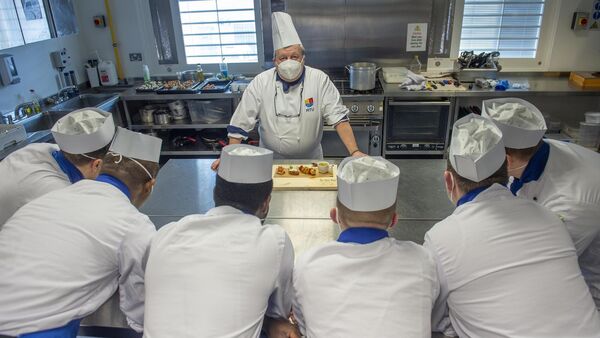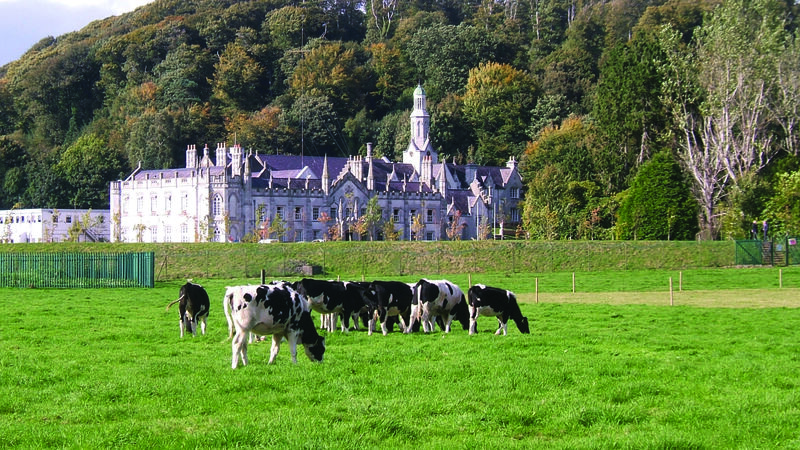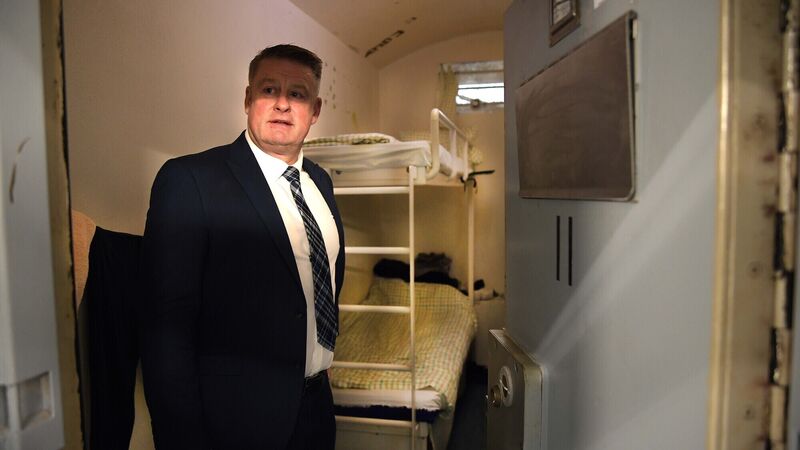The Open Door unlocks paths to a culinary career for prisoners (irishexaminer.com)
Next week, a pop-up restaurant with a difference will open its doors. The venue? Cork Prison – and the menu will be cooked by inmates.
The Open Door unlocks paths to a culinary career for prisoners
Culinary Arts Lecturer at MTU JJ Healy working with some of the prisoners in preparation for the pop-up restaurant Open Door which will take place at Cork Prison on the 5th of April.
At 6.30pm, next Tuesday, 50 people will show up on the Northside of Cork city for what is surely the most curiously exclusive Irish dining experience in many a long year.
Mobile phones are completely prohibited — there will be no Instagramming of tonight’s fare. Passing, one by one, through a humongous floor-to-ceiling metal turnstile and having furnished photo ID, diners will submit to security procedures identical to those in any airport: baggage screening, body scans, follow-up search if necessary.
After that, they will be led through a series of locked doors, the key for the last accessed by biometric authentication. That one opens into a nondescript rectangular yard, bordered on three sides by boxy building units. Raised grass beds with a handful of low-trimmed shrubs attempt to add colour, life, but, for all the world, it might just be another loading bay in an anonymous grey industrial estate.
Across the yard, upstairs, through more doors, diners finally arrive at their tables, running the length of a corridor. Welcome to The Open Door, a pop-up restaurant in Cork Prison, where tonight’s menu will be cooked by the inmates. It is a first for any Irish prison.
The Education Unit training kitchen is on that same corridor that will host The Open Door. Inside are six young inmates in whites, ranging from late teens to early 30s, with their chef-mentor JJ Healy.
They turn as one to clock the new arrival, any novelty a welcome diversion in prison but, introductions over, quickly return to their meticulous rehearsal of the menu’s starter course: tomato bruschetta with mozzarella; smoked salmon ‘roses’ with lemon creme fraiche on brown bread. Two of them spear marinated chicken chunks onto wooden skewers; another stirs spiced butternut squash soup.
Two shyer lads avoid eye contact but the others are soon chatting freely. If Healy issues an instruction, all snap to attention with the alacrity of kitchen pros.
Healy, an MTU Tourism & Hospitality lecturer, was invited in 2019 to address Cork Prison inmates on post-prison educational opportunities. “MTU lecturers came up from sport, tourism and hospitality [all the trades],” says Healy, “it so happened I’d just been in London and met my cousin who works in the UK Ministry of Justice — he told me about Clink.”
In 2009, Alberto Crisci was the catering manager at HMP High Down, in Surrey, when he conceived the Clink concept. Restaurants situated within working prisons, serving food to a very high standard, and served to diners from outside. Its success has been phenomenal, restaurants have been added in seven other British prisons, all hugely popular dining destinations in their locality. Prisoners receive accredited City & Guilds training and Clink Charity ‘alumni’ have some of the lowest offending rates in Britain.
“I was nervous that first day,” says Healy, “I’d just started when a fight broke out in the courtyard, they all ran to the window, I thought, ‘oh, Jesus.’ But then they sat back down, tried some of the food I brought, and began listening to my spiel. I also told them about Clink, said we couldn’t do a restaurant but what about a course finishing with a pop-up.”
Healy’s presentation created a huge buzz and MTU and the prison services were hugely supportive of the notion. All inmates working in the prison’s kitchens were invited to apply for a new core culinary skills module, with seven to be selected. Healy would teach practical skills, and Caroline Lucey, the prison’s Home Economics Teacher, would teach theory. At the end of the two-month course, they would host a pop-up restaurant in the prison, serving a three-course dinner to 50 people.
“We began with basics,” says Healy, “an induction week, how to put on uniform, neck ties, knife skills, cutting veg.” One of the lads is struggling to place a dainty dollop of crème fraîche onto a tiny square of brown bread, using a clumsy large plastic serving spoon, when a teaspoon would be ideal. It perfectly illustrates Healy’s limitations: “They can’t have metal knives, forks or spoons. I had to donate a set of knives, but they had to be approved by the Governor and Chief of Training, photographed and catalogued. They’re counted when they’re issued to me in the morning, counted when they’re returned and matched against the photographic record. For the pop-up, I’ll bring in piping bags for the creme fraiche but they wouldn’t have them here normally.
“You are missing loads of things you take for granted in a normal pro kitchen but the best thing is to see how much they are enjoying themselves and the food. When we did the pork dish [the main course] they loved it. And I love to see the progression.”
When an inmate arrives in prison, they are met by an Integrated Sentence Management Officer who assesses their needs, noting any addictions or medical problems, and then a release plan is created for and shared with the prisoner, including behavioural and developmental goals.
Each prisoner begins at Standard status, entitling them to a weekly gratuity and one six-minute phone call a day. Meet their release plan goals and they can progress to Enhanced status, offering further benefits; fail to meet their goals and they drop to Basic status, with a reduction in their privileges.
Class over, kitchen scrubbed down, two lads remain behind to talk. It is necessary to preserve anonymity and omit personal details to protect them from any unwanted attention from other inmates. Neither can crime nor time be aired so, suffice to say, they present as very ordinary, pleasant, friendly lads, even when speaking with palpable regret and shame of their own paths into prison.
“That first day in the general prison population was a bit daunting,” says Peter, “I was a bit lost, confused. I didn’t know anyone. Most people here know someone in the early days. It’s hard because you have to make friends all over again. But I get on well with people. I haven’t had any problems since I got here.” “And they look after you,” says Declan, “I was a young fella coming in and didn’t have my clothes or shoes. And people called me over and said, here’s a tracksuit, here’s shoes for ya, it made me feel a little bit more ‘homely’.”
Declan worked as a chef before prison, but, having left school at 14, struggled with the academic side of his culinary course and dropped out. Food, however, remains his self-declared passion and he recalls his first prison meal with a grimace: “Pork chop, mash, carrots, parsnip, it came in a cardboard box, it just wasn’t appetising. I would have been eating well on the outside, my favourite dish is chilli crab linguine, I’d have eaten turbot, John Dory. But I’d eat two pork chops for you now!”
Peter also enjoyed eating out and cooking for his siblings and parents and aptitude and ambition have seen him progress steadily in the prison kitchens. “Beef stroganoff is my specialty, I’ve always liked to watch my mom and my father cooking.” Though the communal dining hall is a staple location in most prison dramas, there are none in Irish prisons, to reduce opportunities for violence. Instead, inmates collect meals and return to eat them in their cells.
“It’s a bit miserable,” says Declan, “if you’re eating on your own, but we both work in the kitchen so we get to eat with the other kitchen workers. There’s a few of ye so you can have a bit of a laugh.” Not all prison cooking occurs in kitchens. Each cell has an electric kettle with myriad uses other than boiling water for tea, coffee and pot noodles. “Boiling eggs. Using sealed plastic bags to heat up scones, make porridge, boil milk for latte coffees,” says Declan gleefully, “And these are fellas who’ve never been in a kitchen and they know all these cooking techniques.”
According to Cork Prison Governor Peter O’Brien, loss of liberty is the biggest punishment: “That’s the real pain of imprisonment —and prison really hurts if you suffer the loss of a loved when you are in prison and can’t be there to support your family.” Unsurprisingly, both Declan and Peter find it hard processing the emotional impact of a call home. “I think that’s the toughest, finding out what’s going on,” says Declan. “But we’re given a lot of help, counselling, psychology,” says Peter, “so that all helps your head as well, especially dealing with what brought you in here, what happened in the past, and how you can deal with it and find opportunity in the future.” The course, undoubtedly, is their favourite prison experience.
“It’s great,” says Peter, “JJ is teaching us all these new skills and techniques, we’re getting opportunities here that we never thought we’d have. I would definitely be looking to go into hospitality when I get out.” “I’m thinking of going back to college when I get out,” says Declan, “really putting the head down and getting that one module I missed out on.”
O’Brien’s career in the prison service took him all over the country before winding up back in his native Cork as Governor. The prison service has altered radically in those years, change he has wholly embraced. Where formerly the primary concern was secure incarceration of inmates, a more progressive approach now focusses on the needs of staff and prisoners equally, to arrest the cycle of repeat offending and permanently turn offenders away from a life of crime.
“[The change] was about how you related to inmates, how you supported them. People are sent to prison by the courts for a reason, but then we need to encourage them to rehabilitate, to deal with offending behaviours and give them opportunities, education and work training, support, addiction services, counselling, psychology. Everyone works collaboratively to achieve a positive outcome for a prisoner. And if we can stop them offending when they go back out, there will be less victims — and that’s a major part of our focus as well.” Though O’Brien knew of Clink, he wasn’t keen on the name.
“I wanted our name to be progressive, suggesting hope and opportunity, not something associated with prison. So we ran a competition amongst the prisoners and the result was The Open Door. It’s about looking beyond prison for opportunities and change.” Though the pandemic ended the prospect of a pop-up on the first course, of the seven released over two years ago, none have since reoffended and two are working in hospitality.
Many of the invited Open Door diners are influential players in hospitality, and the event aims to promote the idea of employing ex-offenders in a sector already desperate for staff. Anyway, the sector has traditionally been prepared to take a chance on ex-offenders. The brutality of cheffing is a merciless leveller of reputations and backgrounds; as long as you do a first-rate job, you’re as worthy as the next person.
“Doing this programme gives you confidence, hope,” says O’Brien, “something different to tell your partner or a parent during your call and it gives them the opportunity to be proud of you; the last time they saw you outside, you were being led away by the guards from the court, but now you’ve earned a certificate from MTU anyone would be proud to have on the wall at home.”
Both Declan and Peter can now see more clearly through ‘The Open Door,’ beginning with their first meal on the outside and then stretching on into a bright future.
“Steak with mash,” says Peter. “Yep, there’s something about a steak,” grins Declan, “with a big glass of coke and chunky chips, you can’t beat it.
“In ten years time, I’d like to be working full time as a chef, with at least one kid with my same girlfriend and possibly own a house,” says Declan. “Yep,” says Peter, “Same as himself — family, house, dog, and hopefully working in the hospitality industry.”









